Growing up
I was born and raised in Tokyo, as I come from the family of a famous Russian orientalist Alexander Dolin. My father moved to Japan in the early nineties when he was invited to Tokyo University of Foreign Studies to teach Comparative cultures. Throughout his life he has written numerous books in Russian, English and Japanese languages, which may suggest that I have multilingual writing skills in my blood.
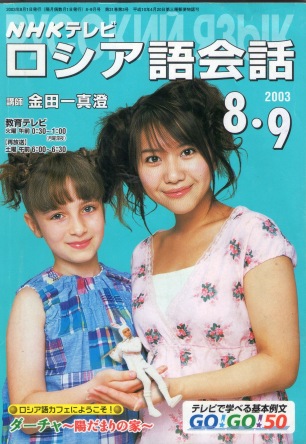
My first interaction with the world of television happened when I was still a child. Just like the majority of expats in Japan, I was involved in modelling. Since the early years of my childhood I was occasionally taking part in some commercial shoots for clients such as Sony, UNIQLO, Shu Uemura, and others.
When I was 7 years old, I was invited to star in an educational programme on the Russian language, which was running on the Japanese state channel NHK. For about a year I played the role of Masha, a granddaughter in a stereotypical Russian family living in a country house. The next year I had my own special part of the programme, where I was explaining vocabulary.
I studied in a Russian school, located at the embassy, and enhanced my knowledge of English in a nearby King’s Road School of English. I graduated with a gold medal, an award which is granted for 100% excellent term marks within the last two years of studies. I had high results for all exams I passed and a few additional certificates in English, Russian and Social studies, which gave me extra credit for my university applications.
I chose to continue my studies in Moscow, where I am originally from. I earned a scholarship to enrol on a BA course in journalism at the National Research University Higher School of Economics (HSE), one of Russia’s leading state universities. My choice was primarily defined by the fact that I loved the atmosphere of creativity and freedom that I felt there, although I had always shown some skills in writing, and some of my relatives had already been involved in journalism.
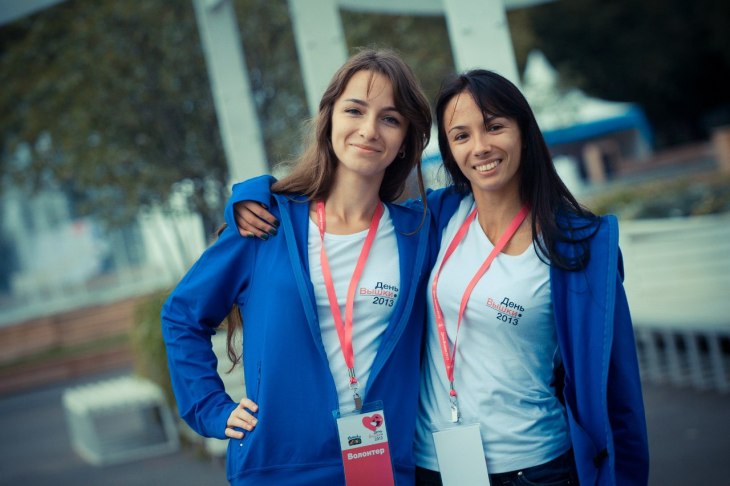
During the first couple of years at the university I was actively engaging in various student organisations and activities. I played in a team of KVN (Club of Witty and Smart, the Russian youth humour sketch show movement), studied in a theatre school, volunteered for Open days and Conferences, and so on. However, what I enjoyed most was organising major student events. I was a member of Ingroup STS, (Initiative group of the Student Union) the oldest student organisation in the university, which had been setting up most events in HSE since its early years of existence. While being a part of STS, I was involved in organising numerous events aimed at the audience of up to 1,500 students, including First-Year Student day in Gorky Park, the Night in the Cultural Centre, 3-day long party trips, music festivals, and many more. I left the committee on my third year of studies, as it was difficult to manage project roles along with my journalistic internships.
I was still on my first year of studies when I started my journey in the media. In 2013 I did my first internship: for two months I was working as an assistant at the Centre of Documentary in RIA Novosti (currently Rossiya Segodnya), one of Russia’s major information agencies. The center provided the ground for showcasing documentary films, usually followed by a discussion panel. I was responsible primarily for writing promotional posts on Facebook and finding experts for the panel. Although the job itself was not much of a challenge, it determined my interest in documentary. It was also my first experience of working along with my studies, which later became my habit and my lifestyle – I finished that year with excellent marks, 4th student in the total rating of 120.
The Kick-start
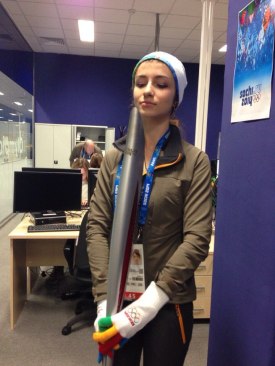
The real turning point in my career and my entire life was my experience at the 2014 Sochi Olympics. I was lucky enough to get a contract with the Olympic Broadcasting Services (OBS) through their Broadcast Training Programme for university students. Thanks to my level of English, I got assigned for 2 months, although an average student contract lasted 3 weeks. I was hired as an ENG assistant, which turned out to be a role within a “Making of” team. It was a small crew within the Olympic News Channel responsible for the “Making of” and “Highlights of the Games” movies. I was assisting the producers, and although my role was mainly office-based, I took every chance to go out on shoots to substitute the camera assistant. Apart from helping onsite, I was responsible to ingest and log all the footage shot by our coastal and mountain crews, and then mark the best shots. Once the Games started, I had another duty of watching every melt reel (or the whole transmission, if the melt reel was coming late), cutting out the best clean shots, and putting them together in a 20-minute long sequence from each day of the competitions. The producers would then watch the bits I had picked and make the final cut from each day, building up the Highlights of the Games.
I still remember the moment I watched the Highlights from the London Olympics as clearly as if it was yesterday, as it was then that I fell in love with sport. Having never been into sport before, never understanding why people from across the world would watch it, I found myself glued to the screen, enchanted and fascinated, unable to take my eyes off of what I saw. I was watching the faces of the athletes who had just set a world record, the tears running down the faces of their family members, the horses hovering over the barriers, the bullets flying in slow motion, and all I knew was that it had never occurred to me before just how beautiful and humane sport could be.
Seeking the path
I came back home from Sochi with a strong determination to change my life forever. I promised myself to do anything to live this miracle over and over again, and so I did. Once I caught up with my studies (I was still finishing my second year of BA), I fringed myself into various internships. In summer 2014 I joined the team of Sportbox, one of Russia’s biggest sports news portals of that time. As an intern, I would learn how to gather and re-write news, write articles, and so on. My internship coincided with the Summer Biathlon World Championship in Tyumen, Siberia happening that summer, and for some reason I felt like going there.
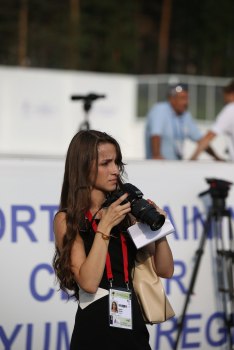
I arranged the trip by myself and offered to cover the tournament for Sportbox in exchange for an accreditation on their behalf. My boss appreciated the initiative, and so I went to cover my first international sports tournament as a journalist. I published several articles and interviews (which were far from being perfect, of course!) and did some networking within biathlon federations and the media.
Soon after leaving Sportbox, which unfortunately could not offer any job positions to interns, I moved on to my next internship at the sports desk of gazeta.ru, Russia’s oldest online newspaper. It was there that my sports writing skills really developed, as I was coming into the editorial almost every single day after my seminars, and I would have 1-3 of my articles published daily. I also went to cover some live events such as snowboard and parallel slalom World Cup in Moscow.
In March 2015 we had Biathlon World Cup stage coming back to Siberia, so I decided to use this chance once again to push myself forward. My boss at Gazeta approved of my idea to cover the tournament, I applied for an accreditation on their behalf and sponsored my own trip. 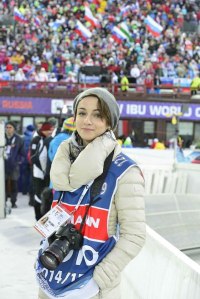
This time it paid off fully: being on my own, with no guidance or advice from colleagues, I produced a successful coverage of the whole tournament. I provided gazeta.ru with numerous news and race summaries, and I managed to interview the top biathletes such as the Olympic champions Martin Fourcade, Anton Shipulin and Marie Dorin-Habert, coaches of several national teams, and even the president of the International Biathlon Union Anders Besseberg.
Transition to TV
While covering biathlon in Siberia, I got acquainted with the crew from Russia-2, the main national channel which broadcasted sports in Russia at that time. They put me in touch with their editorial, and that is how I ended up as an intern there. By that time I had done a bit of a part-time internship with a TV production AB-TV, which I managed to squeeze in between my classes and hours at gazeta.ru. However, my TV experience at the production was nothing like the atmosphere of a live TV newsroom. The moment I walked into the studio I realised that I found what I had been looking for. I just knew that, no matter how hard I had to work and how long I had to wait for a position, I was staying.
Although at the very beginning I had a very thin idea of what exactly I wanted to do, soon I figured out I wanted to become a reporter. Two days after I came in they sent me to cover my first event for the news. I only had to provide an OOV (approximately one-minute long clip), a short text for the anchor and a soundbite. But, given that I had zero training for that and had no senior reporter accompanying me, I was nearly shaking. Fortunately, I was matched with an experienced cameraman, who was kind enough to guide me, and the tournament was just a small corporate one. So the mission was accomplished, and that milestone marked the beginning of a more conscious part of my journey.
It took me some time (and a reasonable amount of struggle!) to re-adjust my writing to TV style, but I have always been a quick learner. In a month, after quite a few news pieces I had done, I was allowed to produce my first authorised full-length feature on the Pool Cup of the Moscow Mayor, which went on air on a commercial channel Sport 1.
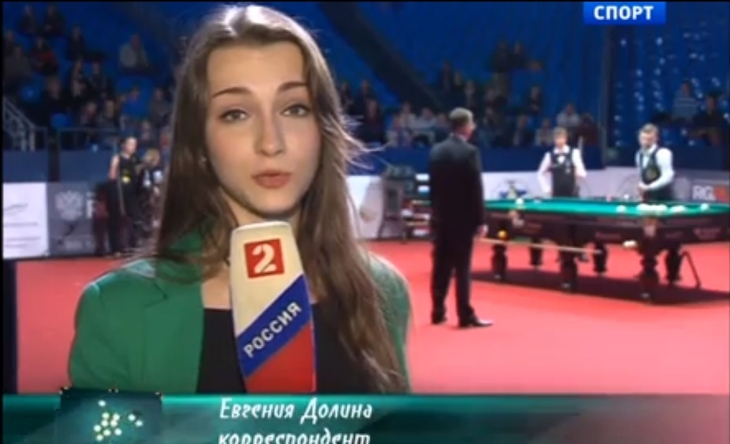
Meanwhile, I learned that Russia-2 was sending a small crew to the European Games-2015 in Baku, Azerbaijan, where I really wanted to go. I decided to try my Coverage-for-Accreditation Strategy once again, so I asked the Line producer for a permission to go to Baku, too. As they could only afford sending 2 reporters and 2 cameramen – the channel was closing down in just a few months – I offered my assistance in exchange for an accreditation. It worked again. To pay off at least a small part of my expenses, I offered my reports and interviews from Baku to Sportbox and vesti.ru. It did not help me earn much, but I did not care, as I was only interested in having a solid ground for gaining experience. Aside from the articles I published, I finally persuaded my editors back at Russia-2 to let me produce my own feature for Russia-2. By the end of the European Games they surrendered, and so my debut piece on the Russian team flag bearer was broadcast nationwide.
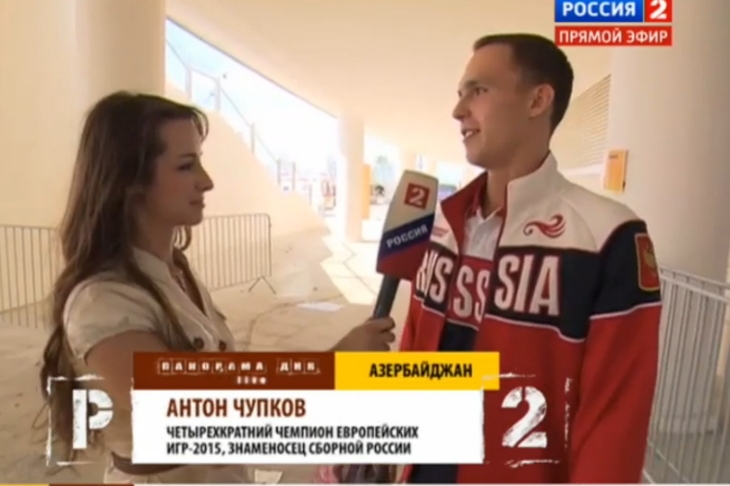
New level
Since then I was no longer an average intern: I had the privilege to have full-length news features broadcast under my name, just like other reporters did. However, Russia-2 was experiencing hard times: soon it had to be closed down, and the editorial team was undergoing severe cuts as it was united with NTV+ Sport channel. The news national sports channel Match TV was to be launched in a few months, but till then there was no clearance in my future with the team. At that point I was offered a part-time position of a sports news editor for vesti.ru sports desk, which had previously published my articles from Baku 2015. As they had one of their editors on childcare leave, I fulfilled the role for the next two months. My responsibilities involved publishing news on the website. The job suited my schedule perfectly, as I was on my last year at the university, but I missed the pace of the TV newsroom. I was offered a transfer to another department of vesti.ru when their editor came back from leave, but all I wanted was to go back to television, regardless of how long it would take me to get a paid position there.
In November 2015 the new national sports channel Match TV was launched. Everything was still very chaotic, so quite randomly I ended up in the production team of “You can do more”, a new morning show about fitness and health. I starred as a presenter in a few episodes of “Fitness gadgets” section, wrote and re-wrote some scripts, but I knew very soon that it was sport, rather than fitness and its glamorous aspects, that I wanted to work in. So I got in touch with my former colleagues from Russia-2 and asked them to take me back on board. They accepted me back eagerly, as they were in desperate need of an extra pair of hands. They could not accept interns yet, as they were very concerned about keeping the high standards of the newly launched channel. However, I was the one they could trust, as they had already seen what I was capable of. They still did not have any paid positions to offer, but I was willing to work hard and wait to earn one. I was finally able to fully immerse myself in what I truly loved – reporting on events, telling stories through features I composed, and hearing my name announced by the anchors of the national sports channel.
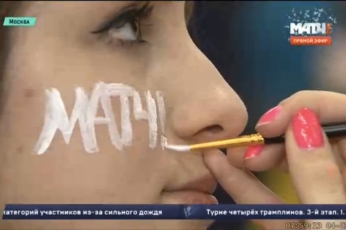
It took me months to get a fully paid position. As much as the chief executive producers of the news department wanted me to get signed, they could not justify creating an extra reporter position to the HR department. So I had to wait until one of my colleagues quit – which was nevertheless more sensible for me, as I was still finishing my BA degree and working on my final thesis. Throughout those months I received a thorough training, which was sometimes quite harsh. The chief producers would watch my features, read my scripts and break them apart, line by line, criticising every single bit of a mistake I made in my writing, editing and reading. However tough their critique got, I am grateful for all the effort they put into helping me grow as a professional.
Road to Rio
Since Sochi 2014 I had been dreaming about going to the Rio Olympics in 2016, which pushed me forward in my career pursuit, as I knew I had a deadline to comply with. Much to my regret, I had no luck in getting myself involved with OBS again. So I sought other ways to make my dream come true. While Match TV had a very limited number of people going to Rio, and certainly no spare accreditations for an intern, I knew I had to act by myself. So I applied for volunteering at the Games, bought my own tickets, and sorted out my accommodation there. Then I started bombarding various media editorials with the very same offer: work for accreditation. At some point I found an option with All Sports Information Agency, which offered me an accreditation on the condition that I start working for them immediately. Soon after the proposal was made, Match TV finally offered me a permanent contract. This in turn put me in the position where I had to choose between the job that I loved, and the dream I had been pursuing so hard. After some careful consideration, for some reason I gave up my accreditation offer. Being all about visual storytelling, I could not bear the thought of leaving TV. So I chose to stick to my volunteering role in Rio – luckily, my bosses at Match let me go.
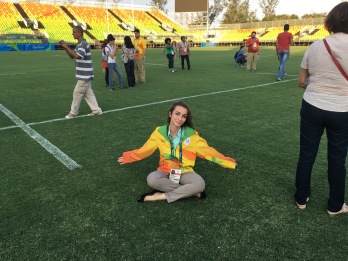 While being in Rio, aside from fulfilling my role at media centre desks, I managed to make a feature for Match TV, providing an insight into a volunteer’s life in Rio, gave two interviews, and did as much networking as I could. While working in the Main Media Centre, I met some people from Japanese Broadcasting corporation NHK, who eventually put me in touch with their Tokyo office. Strangely enough, these different pieces of my life puzzle – my childhood in Japan, my language skills, my sports broadcasting experience and my volunteer trip to Rio – formed into a coherent picture.
While being in Rio, aside from fulfilling my role at media centre desks, I managed to make a feature for Match TV, providing an insight into a volunteer’s life in Rio, gave two interviews, and did as much networking as I could. While working in the Main Media Centre, I met some people from Japanese Broadcasting corporation NHK, who eventually put me in touch with their Tokyo office. Strangely enough, these different pieces of my life puzzle – my childhood in Japan, my language skills, my sports broadcasting experience and my volunteer trip to Rio – formed into a coherent picture.
Exploring new grounds
Soon after Rio I had to quit my job at Match TV. The reason for that was my successful application to Goldsmiths University. As I chose to take up a Masters degree abroad in UK, I had no choice but to resign. It was an extremely hard choice, as I had to start my journey all over in the country where I was a complete stranger, but I decided to take the risk. I knew sports broadcasting industry was struggling in Russia (after all, I wrote a thesis on it!). I wanted to see how things are done somewhere where sports media is flourishing, somewhere where I could learn from the top professionals of the world. Eventually I chose UK as I was proficient in the language, the expenses seemed affordable, and I had always admired British sports media culture. Besides, I had already known some people working in UK, and so I was hoping for exciting internships – after all, it was work experience, rather than a degree, that I was seeking there.
A major part of what I studied at Goldsmiths consisted of things I had already known from my professional experience. Nevertheless, I did gain some valuable knowledge: I received an intensive training in British media law, got a much deeper insight into the technical side of things (filming, editing in Adobe and operating studio equipment), and learned to write and present in English.
The biggest challenge was to accept the fact that I was basically starting my career from scratch, and the fact that I was a foreigner with legal work restrictions posed an enormous challenge. It took me months to get adjusted to my life in London – and fall in love with it. Despite being quite an international, well-travelled person before, I feel that living in such a cosmopolitan, diverse city simply cannot leave a person unchanged. My horizons, my views on life, my beliefs have broadened drastically, which has hopefully transformed me into a true citizen of the world.
As I could not bear my own existence as an unemployed student, I was actively seeking internships and work opportunities from the very first day in London. Soon I started working as a freelance researcher for Gracenote Sports. I was in charge of gathering information on athletes and compiling them in biographies for databases of various sports organisations. After a month or so, I managed to get employed as a Student Residence coordinator at my university, which gave me a chance to live in my accommodation for free. I was in charge of posting on social media and hosting events for students living in the Halls. Finally, in March I found my third job – I started doing some freelance mobile broadcasting for Punditto, a British startup which is developing a mobile platform for sharing sports fan content.
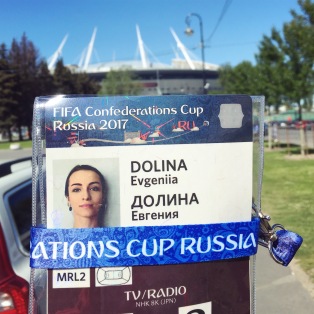
By then I had already received an offer from NHK, Japan, to work for them as a coordinator at FIFA Confederation Cup 2017. I had just enough time to finish my final thesis documentaries before flying off back to Russia. During the tournament I was coordinating the team of 8K Super-Hi Vision Television team in St. Petersburg and Kazan cities. This experience in turn helped me get an offer for the 5th Asian Indoor and Martial Arts Games 2017 in Ashgabat, Turkmenistan. Just a few weeks after the Confederation Cup had finished, I was taken onboard by a British company Progress Productions, which dealt with sports presentation at the Games. For the next 6 weeks I was working in Ashgabat as a Production coordinator, firstly from the office and then within my venue, Muai Thai and Kickboxing Arena. Due to the fact that Turkmenistan is one of the most closed countries in the world, with a Soviet-like bureaucratic system typical for an Asian. dictatorship, the job had been the most challenging professional experience in my entire life. However, despite all the obstacles, I managed to run my venue smoothly. Sports Presentation at my arena was highly praised by Chancellor of the Games.
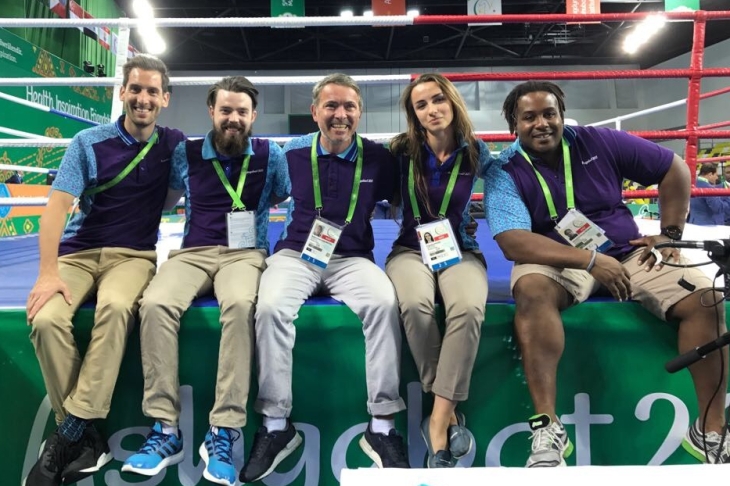
Moving on
After AIMAG 2017, I came back to London and immediately started my 2-week long internship at Perform Group, where I learned to cut sports news using Dalet system. Then I went on to my next internship at Engage Sports Media, which has recently rebranded into Engage Digital Partners. It was a modern content company that partners with rights-holders and brands to create, distribute & monetise engaging sports content. I got the chance to participate in all aspects of sports content production such as researching trends on social media, scriptwriting, filming, editing and composing commercial presentations. I absolutely loved my time at Engage, and they seemed to have appreciated me as well. Unfortunately, they were unable to offer me a position at that time, particularly in the light of the legal implications of my status in UK – my student visa would only allow me to work till January 2018.
Before I could work out a solution for my case, I was forced to come back to Russia due to my mother’s stroke. After a few weeks back home dealing with the new circumstances, I started looking for a job that would leave me with enough time to look after my mother. Eventually I settled as an assistant marketing manager at InStat Sport, a leading company in performance analysis solutions with 1400+clients across the world. I chose to shift from journalism as I wanted to remain in sports and gain some experience in the marketing side of things. Soon, however, I realised that my position had mostly to do with composing commercial offers, rather than producing any content. At the very same time I received an offer from Northern Lights, a small production company within the Moscow bureau of NHK. The team was in charge of producing long-form programmes for the Japanese television. They invited me onboard as a coordinator – or, rather, someone dealing with producing, coordinating, translating and occasionally reporting. As I love being all around the place doing everything at once, and the job posed enough challenges and opportunities to learn more about the industry, I accepted the offer. By the moment this biography is being written, I have worked on several projects handled by NHK and Northern Lights.
Alongside with the offer from Moscow bureau, I was called back to join NHK 8K team at the FIFA World Cup 2018, performing the same functions that I had during the Confederation Cup.
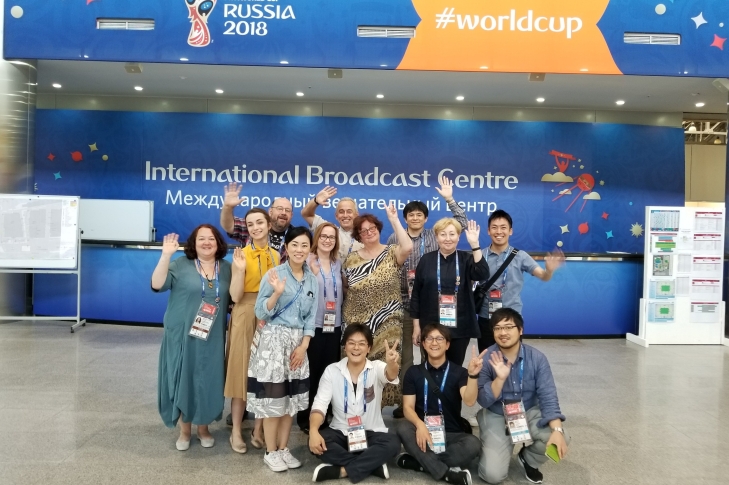
My contract at World Cup 2018 lasted for about 1,5 months, and it was indeed a great experience. Our team covered 8 games in Moscow, Saransk and Kazan, so I got to witness the Opening match and the Closing Ceremony. As I was keeping in touch with my contacts at BBC, I was invited to give a small interview for BBC World News. I did it twice: once over Skype, and the other interview happened in BBC studio near the Red Square. Meanwhile, as I was actively sharing my impressions of the event over social network (as much as my contract allowed me, of course!), I was approached by BBC World News Radio team on Twitter. Eventually I ended up on BBC World News Radio, too – three times! Being a 22-year-old young journalist at that time, I felt absolutely thrilled and honoured to be on air with BBC.
Soon after World Cup 2018 I carried on working for NHK Moscow team. In August I was involved in Kazan Redbull Air Race. My last sports event was an international figure skating event, which happened in Moscow in November. Since then, unfortunately, our production team at NHK started experiencing bureaucratic difficulties with obtaining accreditations, and therefore we were mainly based in the office.
Meanwhile I was starting to miss the creative aspect of working in the media, as my role mainly had to do with organizational aspects. So I started seeking freelance work in content creation. Eventually by the end of 2018 I stepped into copywriting.
As I have always been good at producing written content, I was quickly appointed to write articles for the websites of Unilever group brands (such as Lipton, Rexona, Knorr and so on). In summer 2019 I also started writing for Movavi – an international company which produces software for video editing. As the team highly appreciated my skills in both Russian and English, by the end of the year they invited me to take over Blog department by becoming its Creative Editor. As this was meant to be my first senior position, I accepted the offer gladly. I left NHK Moscow team, so my transition from TV to content-marketing finally happened. I am currently in charge of making our monthly content plan, setting deadlines for the team, proofreading articles and liaising with product marketing teams at Movavi to ensure strategic development of our blog.
Half a year after I had stepped into my first role as a leader, I’ve started sensing that I’m not quite satisfied with what I was doing with my life. I was doing fine, I was making decent money, and I knew I could do even better. I could see the route in front of me – and yet I didn’t want it, as it wouldn’t make sense. The question was, what would?
The answer was always right there within me. Back in high school, when I was still considering my future career, I knew I wanted to do something useful. I believed I should make this world a better place, and there is nothing more sensible than dedicating one’s life to serving humanity.
Did I stick to what I believed in back then? No. Was I making the world a better place? Not really. I was making my own life better. I was primarily working for my own benefit. So I lost the sense.
Luckily for me, it all occurred to me right before my 25th birthday, so I knew it wasn’t too late to act.
From now on my main ambition is to work for international humanitarian organizations such as the structures of UN (UNICEF, WHO, UNDP and so on), Red Cross and other authorities involved in projects and missions that serve the values I share.
In the future I see myself fulfilling my mission by contributing to this world with my skills and experience. Therefore I am currently applying for volunteer programs at UNV and permanent positions at the organizations listed above. I am interested in opportunities that have to do with media and communications, as that’s the field I’m most skilled in.
Meanwhile, I’m continuing my work at Movavi, as there are still many things I would like to improve and introduce to this project before I leave.
On this journey, I keep on learning from the best professionals, seeking every chance to improve my knowledge and skills, and pushing myself further. I believe one should never stop moving forward, and never stop having fun.
